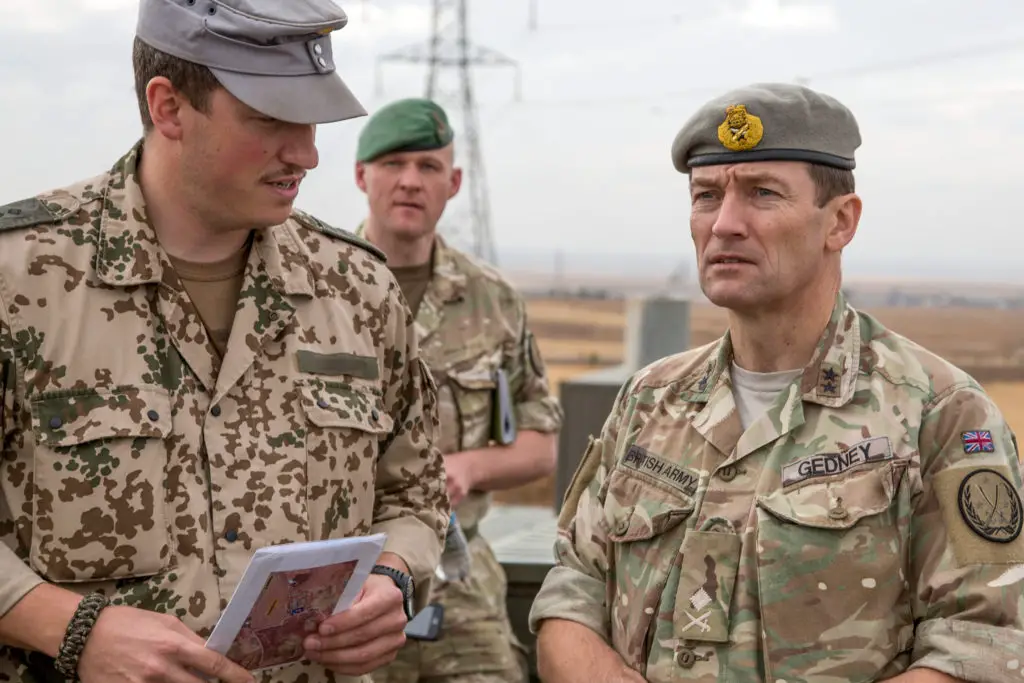Burden sharing and retaining influence
The threat from Moscow – recently made clear by the nerve agent attack on a former Russian double agent on British soil – is only part of the challenge facing the U.K. in terms of its NATO commitments. U.S. President Donald Trump has made no secret of his displeasure at the failing of many European alliance members to fulfil their defence spending obligations.
Although Britain meets the 2 percent of GDP defence expenditure target and is therefore far from the worst offender regarding low levels of spending, it also has an outsized ability to set the tone and help reduce the risk of U.S. disengagement.
The value Washington places on the U.K.’s contribution was recently made clear in a leaked letter from Secretary of Defense James Mattis to his British counterpart Gavin Williamson, in which he raised his concern over the erosion of the U.K.’s military capabilities. These worries are hardly likely to be assuaged by Britain sticking to its current withdrawal plans.
Military commitment also brings political influence. Since the days following the Brexit vote, the British Government has been at pains to say that its commitment to European security remains undiminished – in no small part because London realises that, with the U.K.’s departure from the E.U. in 2019, NATO will soon be the country’s primary institutional bond with the continent. It is, therefore, an unfortunate coincidence that the year of Brexit will also see the last British Army field units depart from Germany after a 74-year presence.
 British Army Major General Felix Gedney, deputy commanding general of Combined Joint Task Force – Operation Inherent Resolve, strategy and support, speaks with a German officer during a battlefield circuit to review coalition training near Erbil, Iraq, November 22, 2017. Image: US Army/Sgt. Tracy McKithernAlternative ways forward
British Army Major General Felix Gedney, deputy commanding general of Combined Joint Task Force – Operation Inherent Resolve, strategy and support, speaks with a German officer during a battlefield circuit to review coalition training near Erbil, Iraq, November 22, 2017. Image: US Army/Sgt. Tracy McKithernAlternative ways forward
Thankfully, there is still time for a reversal of current plans. The U.K. Government is currently conducting a defence review known as the Modernising Defence Programme. The review has seen a bitter battle to obtain additional resources for the military from the Treasury and has recently had its publication delayed – despite an urgent desire to finish it in time for this week’s NATO summit. But it still represents an opportunity for a policy shift on the Army’s future European presence that would be both affordable and have real practical and political benefits.
The British Army has two broad options for preserving a substantial European footprint. The most basic would be to utilise assets warehoused in Germany – vehicles, ammunition, spare parts, etc. – as pre-positioned resources for personnel based in the U.K. who would be flown out for exercises or in a crisis. Compared to shipping everything required from Britain, such forward basing of resources would have major benefits in terms of saving time.
There have already been indications that this pathway is gaining favor, and that the plans for the final stage of the British Army’s withdrawal from Germany may not be fully carried through. Speaking in January, the then head of the Army and now Chief of the Defense Staff, General Sir Nick Carter, said that the force was examining if it should retain its remaining storage and training facilities in the country in the long term. In 2017, it was revealed that the Army’s vehicle depot facility located in Ayrshire Barracks, Mönchengladbach, will be retained until at least 2023.
The more proactive option would be to halt and partly reverse the Army’s withdrawal of personnel from Germany. At present, 20th Armoured Infantry Brigade remains the last major formation in the country, but it is already in the process of moving back to the U.K.
Sustaining a brigade and supporting elements – around 5,000 personnel – in Germany would provide a useful contribution to NATO’s ability to surge forces east in an emergency. Putting the brakes on current plans would generate costs and create complications for planned changes to the Army’s structure, but the fact that one of the force’s main tasks must now unavoidably be seen as a deterrence mission against Russia is likely to make such inconvenience worthwhile.
Whatever decision is finally taken, it should be based on the recognition that the U.K.’s security will remain intertwined with that of Europe, and is inextricably linked to the sustainability of NATO. A significant land force on the continent would help Britain further its interests and those of its allies.

Rowan Allport is a Senior Fellow and the Security and Defense team lead at the Human Security Centre, a London-based think tank. He holds a PhD in Politics and an MA in Conflict, Governance and Development from the University of York. Specializing in strategic analysis and international security, Rowan has written widely on U.K., U.S. and NATO defense policy, as well as on broader issues relating to interstate conflict.
Follow him on Twitter @DrRowanAllport.
All views and opinions expressed in this article are those of the author, and do not necessarily reflect the opinions or positions of The Defense Post.
The Defense Post aims to publish a wide range of high-quality opinion and analysis from a diverse array of people – do you want to send us yours? Click here to submit an Op-Ed.
Source link : https://www.thedefensepost.com/2018/07/10/british-army-future-europe-opinion/
Author :
Publish date : 2018-07-10 07:00:00
Copyright for syndicated content belongs to the linked Source.



